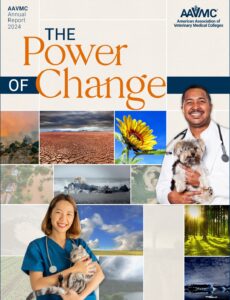MEDIA CONTACTS:
Jeff Douglas or Jeanne Johnson
Phone: 202/371-9195, x144
Email: jdouglas@aavmc.org or jjohnson@aavmc.org
WASHINGTON, D.C., July 14, 2021 — The communications team at the University of Wisconsin School of Veterinary Medicine has been awarded the 2021 Communications Excellence Award from the American Association of Veterinary Medical Colleges (AAVMC).
Wisconsin was recognized for overall programmatic excellence and an historic 2020 Super Bowl commercial featuring their world class veterinary oncology program. That spot reached a live audience estimated at more than 100 million people and generated 2.56 billion media impressions.
“I would argue that there has never been a broader reach to the world’s public highlighting the impact and importance of veterinary medicine on both animal and human health,” wrote UW-SVM Dean Dr. Mark Markel in an introductory letter that outlined the massive amount of logistics required to mount the effort and assessed the impact.
The rare opportunity for academic veterinary medicine crystalized when WeatherTech Corporation owner David McNeil decided to produce and air a commercial during the 54th Super Bowl detailing the saga of his beloved seven-year-old Golden Retriever Scout, who was suffering from a cardiac tumor.
The “Lucky Dog” ad played during the 2020 Super Bowl, the CBS special “Super Bowl Greatest Commercials,” and generated stories on major media including NBC Nightly News, ABC’s World News Tonight, NPR’s Morning Edition, NBC’s Today Show, People Magazine and many more.
UW’s Communications and Marketing Manager Ashley Voss and Publications and Media Relations Manager Meghan Lepisto led efforts to support the commercial with production assistance, media outreach, a viral social media campaign, and a special, virtual event.
Markel said the extraordinary opportunity surrounding the Super Bowl commercial was just the beginning of a year that encompassed many communications challenges. “Ashley and Meghan led the school’s communication around veterinary medicine’s impact on both animal and human health but then also excelled in our communication strategies around social justice, response to the COVID-19 pandemic and funding for the school’s expansion project.”
“Our success on this front was in no small part due to Ashley and Meghan’s continued and successful strategic thinking about how we should communicate with our stakeholders,” said Markel.
The communications staff also played an important role in building support and awareness for a six-year capital campaign that generated resources to help construct a $150 million expansion to the school’s physical plant, which is now underway.
The award will be formally presented during the annual meeting of the Association of Veterinary Advancement Professionals (AVAP), to be held virtually on July 27.
A team of five communications professionals representing various organizations in the Washington, D.C.-based Federation of Associations of Schools in the Health Professions (FASHP) judged the award.
Founded in 2013, the AAVMC Communications Excellence Award is designed to recognize the important role communication programs play in advancing academic veterinary medicine and the profession.
ABOUT THE AAVMC
The member institutions of the American Association of Veterinary Medical Colleges (AAVMC) promote and protect the health and wellbeing of people, animals and the environment by advancing the profession of veterinary medicine and preparing new generations of veterinarians to meet the evolving needs of a changing world. Founded in 1966, the AAVMC represents more than 40,000 faculty, staff and students across the global academic veterinary medical community. Our member institutions include veterinary medical colleges and schools in the United States, Canada, Mexico, the Caribbean, the United Kingdom, Europe, Asia, Australia, and New Zealand as well as departments of veterinary science and departments of comparative medicine in the U.S.
– 30 –





SHARE